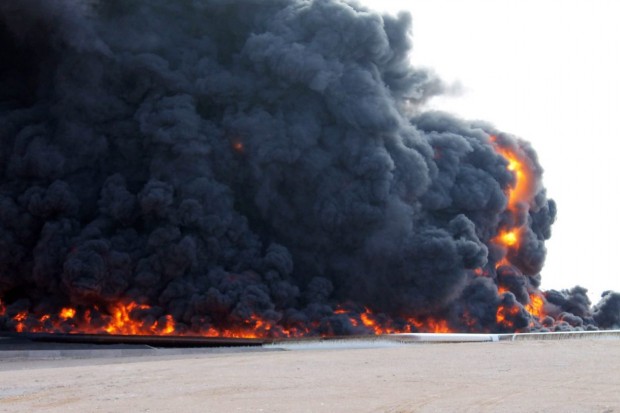Libya: Help appeal to put out fire in oil tanks

Wall Street Journal
Libya’s state oil company requested help to extinguish burning oil tanks after Islamic State fighters resumed attacks on a key terminal in the east of the country.
The attacks stoked fears the North African country’s oil industry is the next target for the radical Islamist group. They come just weeks after representatives of Libya’s two rival governments signed a power-sharing agreement that called for the formation of a national unity government by mid-January.
A crude-oil storage tank ignited Tuesday after Islamic State attacked eastern Libya’s Es Sider terminal for a second day, a spokesman for Libya’s National Oil Co. said. Another facility had already caught fire after the extremist group shot at the neighboring Ras Lanuf oil port on Monday.
Both sites are more than 400 miles east of Tripoli, the nation’s capital.
Es Sider and Ras Lanuf, which can ship as much as 560,000 barrels a day together or nearly half of the country’s export capacity of 1.3 million barrels a day, have been shut for more than a year. But they still contain large quantities of oil in storage. Libyan oil officials said the burning oil tanks held up to one million barrels.
Unable to quell the fire, NOC said on its website it was “helpless and not being able to do anything against this deliberate destruction to the oil installations,” and urged “all faithful and honorable people of this homeland to hurry to rescue what is left from our resources before it is too late.”
When a previous oil-tank fire ignited amid fighting between rival factions in Tripoli a year ago, NOC called for international help but was ultimately able to put out the flames.
This time, however, Libya’s oil industry faces relentless attacks from Islamic State’s eastern Libyan branch, which claimed the first attack on Es Sider Monday.
Islamic State has been making inroads in Libya, following setbacks in its strongholds in Syria and Iraq.
The group has taken control of the city of Sirte and has developed a presence in the city of Ajdabiya—both close to the attacked terminals—Western security officials have said. The group has also become increasingly assertive in Sabratah, which is close to a western Libyan oil and gas terminal partly owned by Italy’s Eni SpA, Libyan and Western security officials say.
Early last year, the extremist group claimed attacks on several oil fields in central Libya, with the damage forcing France’s Total SA to book a write down on one of the targeted facilities.
U.S. officials say they suspect the group is trying to replicate a strategy of attacks against the oil industry already applied in Syria and Iraq. In western Iraq, Islamic State’s predecessor, Islamic State of Iraq, initially sabotaged and attacked oil fields and pipelines. Once the facilities became less valuable as they got damaged and risky to protect, the group took control of the assets.
Libya’s oil production has been crippled by a violent conflict between rival factions vying for power. The country once produced as much as 1.5 million barrels a day but now produces less than one-third of that amount, according to the National Oil Co.
How to submit an Op-Ed: Libyan Express accepts opinion articles on a wide range of topics. Submissions may be sent to oped@libyanexpress.com. Please include ‘Op-Ed’ in the subject line.
- CBL devalues dinar by 13.3% against foreign currencies - April 07, 2025
- Libyan teen wins bronze for natural antibiotic discovery - April 07, 2025
- Tunisia begins major migrant camp clearance - April 05, 2025


